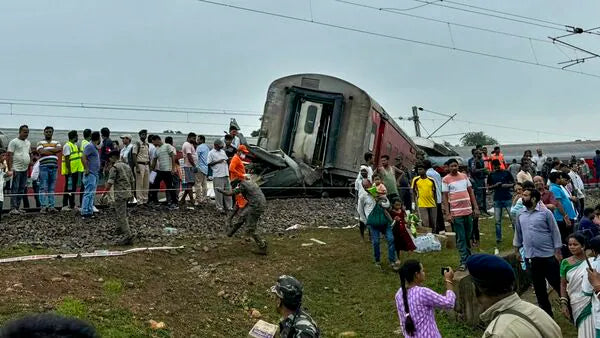India has witnessed a series of tragic train accidents, with the recent collision in Jharkhand adding to the growing list of mishaps. These incidents have occurred across various states, including West Bengal, Chandigarh, Odisha, and Andhra Pradesh, claiming hundreds of lives and leaving many more injured. At Milan Safety, we believe it’s crucial to understand the reasons behind these accidents and how to stay safe during such situations.
Why Do Train Accidents Happen?
Train accidents can occur due to several reasons, including:
-
Human Error:
- Mistakes made by train operators, signalmen, or maintenance crews can lead to collisions and derailments.
- Fatigue, lack of proper training, or negligence can significantly contribute to human error.
-
Technical Failures:
- Mechanical failures, such as brake malfunctions or track defects, can cause trains to derail or collide.
- Inadequate maintenance of railway infrastructure and trains can exacerbate these issues.
-
Weather Conditions:
- Extreme weather, such as heavy rains, fog, or heat, can impair visibility, weaken tracks, or cause landslides onto tracks.
- Flooded tracks or snow accumulation can also disrupt train operations.
-
Sabotage and Vandalism:
- Deliberate acts of sabotage, such as tampering with tracks or signaling systems, pose severe risks.
- Vandalism can damage critical components of the railway system.
-
Infrastructure Issues:
- Overloaded tracks, aging infrastructure, and insufficient investment in modernization can lead to accidents.
- Rapid urbanization and encroachments on railway lands can also create hazards.
How to Stay Safe During Train Travel
While the causes of train accidents can be complex and multifaceted, passengers can take certain precautions to enhance their safety:
-
Stay Informed:
- Keep track of weather conditions and news reports about railway operations.
- Use reliable sources for updates on train schedules and potential delays.
-
Choose Safe Seating:
- When possible, choose seats in the middle cars, which are generally safer in case of collisions or derailments.
- Avoid standing or sitting near the doors or exits during travel.
-
Follow Safety Instructions:
- Pay attention to safety briefings and instructions provided by train staff.
- Familiarize yourself with the location of emergency exits and safety equipment, such as fire extinguishers.
-
Stay Alert:
- Remain vigilant during your journey, especially at night or in remote areas.
- Report any suspicious activity or unattended luggage to train staff or authorities.
-
Emergency Preparedness:
- Keep your mobile phone charged and accessible for emergency communications.
- Carry a small emergency kit with essentials like a flashlight, first-aid supplies, and important contact numbers.
-
During an Accident:
- Stay calm and listen to instructions from train staff.
- If there is smoke or fire, cover your mouth and nose with a cloth and move to the nearest safe exit.
- Assist fellow passengers if possible, but prioritize your safety.
Conclusion
The series of train accidents from Jharkhand to Odisha underscores the need for enhanced safety measures, better infrastructure, and vigilant passenger behavior. While authorities work on improving the railway system, passengers can play a crucial role in ensuring their own safety by staying informed, prepared, and alert.
At Milan Safety, we are dedicated to promoting safety in all aspects of life. By understanding the causes of train accidents and taking proactive steps, we can contribute to safer travel experiences for everyone.
For more safety tips and information, visit our website: milansafety.com. Share your thoughts and experiences in the comments section.
Stay safe and vigilant!
Alnoor Amin Gadiya
Safety Consultant, Trainer, and Your Safety Partner
